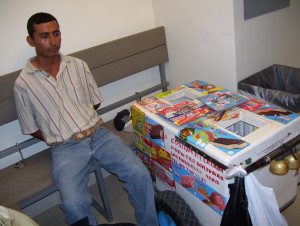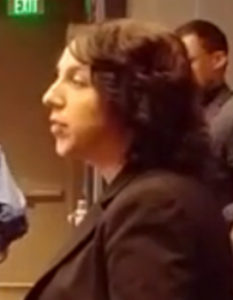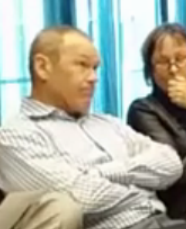
Even after all this time, it’s hard to understand why these people are so dead-set against legalizing and regulating something that’s not only happening now, but is going to be happening in the future because it’s an integral part of the culture of Los Angeles. We have some ideas, but whatever their reasoning is, we don’t think it would be too much to ask that they tell the truth while they’re opposing it.

And this brings us to Rodriguez Strategies flackette Jessica Borek.

The Guardian watched as BMWL and Partners employees handed out red shirts emblazoned with the slogan “STOP Unfair Beverage Taxes,” but they weren’t alone. In the corner was a slickly dressed woman handing out talking points to the opposition. She identified herself as Jessica Borek, a consultant with Rodriguez Strategies.
All they wanted there was fairness too! Did you even know the world was so unfair to people who hire Rodriguez Strategies? Me neither. And Jessica is really just thinking of the street vendors here. Later on she explains that since it’s an all cash business, they’re just going to be targets of crime, possibly perpetrated by aggressive homeless panhandlers! Really, they just want to keep it illegal because that’s BETTER for street vendors. Never mind that one, there are already street vendors, so legalizing it couldn’t actually increase crime against street vendors. Two, if they’re legal they’ll be far more likely to call the police if they’re victims of crime, and three, if they’re legal they’ll be able to get business banking services including mobile card payment systems. It’s so sadly obvious that these people are just throwing objections out to see if any of them make sense. Not so far, they don’t.
But at least Jessica’s not a liar, or at least not revealed as one yet. Oh, except for the fact that she thinks she’s running a “grass-roots” campaign. Jessica, the “grass-roots” in this case are all getting mown down by your paymasters and thrown into the fire. But yeah, never mind the jail time, never mind the terror on the streets, never mind that the only plausible reason the BIDs have for opposing this law is that they’re making a bundle of money locking people up for things that aren’t against the law in any sane place. That and their neurotic obsession with imposing their sterile, orderly visions on the lovely chaos of Los Angeles. Never mind any of it. IT’S NO FAIR!!!!
Transcript:
John Tronson: And, um, and, so let’s move on to a discussion of the, uh, street-vending ordinance. [unintelligible] would you like to take the lead?
Marie Rumsey: OK, Kerry, you want me to start it off? OK, so this is a one-pager for you guys on the street-vending ordinance, and also [unintelligible] from Rodriguez Strategies. And, um, what we’re trying to do right now, for a lot of you [unintelligible], downtown Los Angeles, and we’re focused on the issue of street vending, right now, um, there’s currently a proposal, before the city council, that would legalize street-vending and, there’s a couple problems with the proposal. One, it doesn’t have any limits, so street-vending could happen in any neighborhood, anywhere. Um, two, there’s no limits on what kind of goods can be sold, so they, anything could be sold from food, to merchandise…
John Tronson (interrupting): [unintelligible]
Marie Rumsey: Uh, yeah, it’s a little loose. The other huge problem with it is the fees associated with it are so low that they wouldn’t pay for any kind of enforcement [unintelligible] program kinda taking over our streets and I think what you guys know in Hollywood is our streets already have a lot of issues. Um, a lot of that has to do with the Lavan decision and, you know, our homeless issues related to that, so we are organizing small businesses, all the BIDs across the city, and asking them to take a position of opposition against this proposal. Um, and we have retained Rodriguez Strategies to help us do that, um, because CCA can’t do that work all across the city, and so we’re here tonight to talk to you about it, answer questions, and then also do some organizing [unintelligible] support.
Jessica Borek: So [unintelligible] and I are going to be leading the grass-roots outreach and organizing for this, I mean, it’s not a campaign, but we’re going to be running it like a campaign. Um, we’re gonna set up a canvass in most of the city council districts including, uh, Mitch O’Farrell’s, and we’re gonna go door-to-door, business-to-business, just to hand out fact-sheets, let them know about the proposal, how it would impact the business community, the residential community, in these different areas. We do have a sign-up sheet, um, tonight if anyone is interested, um, in just signing up to oppose the measure as it stands, which is a blanket legalization, um, as Marie said, not enough money to enforce it, so, there will be compliance issues. Um, and again, if you have any relationships within this area of folks that are impacted or will be impacted by this legalization of street-vending, we’d be interested in taking a separate trip out to just talk to them one-on-one, see if maybe they’d be interested in sharing their story with either their council member or with us for use in our media and additional outreach.

Jessica Borek: Yeah, and where does the water and the trash go?
John Tronson: Yeah! And, and, a lot of times they’ll set up camp right in front of a, you know, retail establishments, and, and, so people can’t get in and outta those, and it’s just a, it’s a really bad idea from every perspective I would say.
Jessica Borek: And we know, council needs to hear from community folks like you, um, and so our, we’re gonna really work to build that coalition from the ground up starting today, and I know we presented to the Sunset BID on Tuesday, um, and we’re really excited to be working with some folks from there as well, so if you’d like to just fill this out to begin with, um, we’ll make sure to stay in touch with updates and as we do the canvass if we’re, when we’re back in this neighborhood to stop by or give you a call or send you an email if there’s [unintelligible].
Other guy from RS: [unintelligible] agree that this is a big problem, and we have a lot of time and resource here [unintelligible] you know, definitely canvass on the ground [unintelligible] really use some help [unintelligible] to folks, you know. We have canvassers out there [unintelligible] business owners themselves I’m sure, those of you who own businesses know [unintelligible] come to your door and [unintelligible] talk to them, so if you can just email us, you know, an introduction, and we’ll take it from there, we’ll drop letters for folks, um, but, we’ll really appreciate it if you can with, uh, getting access to your network, [unintelligible].
Marie Rumsey: I think the other thing to share with you guys is, the other side, who is proposing to legalize this, really, the proponents of it, they’re very well organized, um, they commissioned to have an impact study, the study’s gonna show that if the city were to create a legalized vending framework it would reap 37 million dollars a year in new taxes and [unintelligible] micro-enterprise business, you know, kinda get [unintelligible] poverty initiative, um, so, there is significant [unintelligible] we’re playing a little bit of catch up.
Jessica Borek: They’ve created a very sympathetic narrative to the public, and I think we have just as many [unintelligible] stories that we can share, from, from entrepreneurs and folks who have built businesses playing by the rules from the ground up, um, that we would like to share as well.
Mark Echevarria: Does the, does the ordinance call for these vendors to be inspected by the health inspector, such as brick-and-mortars are?
Marie Rumsey: It does, [unintelligible] county health, [unintelligible], but now there’s nine county health inspectors for the entire county and the report estimates that there’s fifty thousand of these vendors [unintelligible], so thinking that enforcement is gonna change from how it is now [unintelligible].
Jessica Borek: And there’s fifty thousand now who are illegal [smug chuckling] [unintelligible].
Mark Echevarria: So, I’m sorry, is the main drive that the proponents have is for taxes, is that the main purpose for doing this?
Marie Rumsey: I think the main drive that they’re going towards is that they’re trying to legalize a network of folks who have been trying to work and make a living, so the big thing is talking about bringing people out of the shadows and letting them work legally.
Other guy from RS: [blah blah blah] because obviously street vending hurts everyone. It hurts workers… [blah blah blah]
[blah blah blah…]Jessica Borek: And I think we just came from meeting with, um, Central City East, near the Fashion District and the Flower District, and she brought up a good point, you know, when you’re talking about increased crime on the streets, with, uh, the homeless population and others that are aggressive panhandlers, they have had, you know, they’re just, it’s cash ready for the taking on the streets there could be, maybe, increased crime that comes with having an all cash business set up on the sidewalks.
- Transcription, as always, after the break. Oh, but you know that by now or you wouldn’t be reading this footnote!
Image of heladero chained to bench in 2007 is a public record, obtained from the HPOA under the California Public Records Act. Other images are ©2015 MichaelKohlhaas.org.
